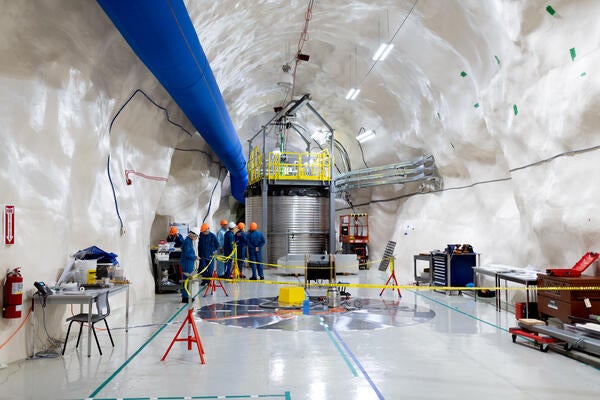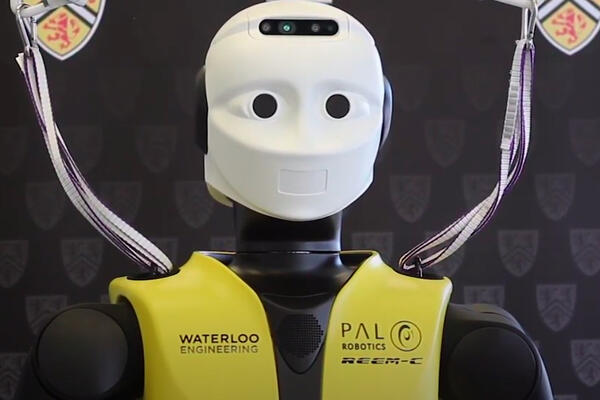WATERLOO, Ont. (Wednesday, Nov. 24, 2010) - A University of Waterloo engineering professor will investigate the future of the Internet while another will probe wireless communications networks with support from new Canada Research Chairs.
They are two of the four Waterloo researchers to receive $5.6-million in new funding announced by the federal government today at the 10-year celebration of the CRC program. A third Waterloo engineering professor will study nanotechnology in radio-frequency systems and a fourth will explore multimedia data compression.
As well, four professors received renewals worth $2.9 million for their existing Canada Research Chairs. The federal program gave the eight Waterloo researchers $8.5 million in total over five to seven years.
"This generous funding allows the University of Waterloo to continue to create an environment conducive for ground-breaking research and offers a stimulating environment for our graduate students to engage in research," said George Dixon, vice-president of university research at Waterloo.
The Canada Research Chairs are positions that allow a faculty member to focus on research as well as on training the next generation of scientists.
* One of Waterloo's new Canada research chairholder is Catherine Rosenberg, a professor of electrical and computer engineering. She holds the Canada Research Chair in the Future Internet. She will receive $200,000 annually for seven years.
The research explores novel directions in wireless networks, social networks and incentive-based mechanisms between Internet stakeholders. Rosenberg aims to create breakthroughs in the design and practical implementation of the future Internet and develop highly efficient protocols and techniques to improve the Internet user’s experience.
* The second new Canada Research Chair goes to Weihua Zhuang, a professor of electrical and computer engineering. She holds the Canada Research Chair in Wireless Communication Networks. She will receive $200,000 annually for seven years.
The research involves developing distributed radio resource allocation and network control algorithms and protocols for vehicular ad hoc communications. Zhuang seeks to provide a deep understanding on how a large number of vehicles on road and high vehicle speed can impact network stability and performance, as well as to design networking protocols for efficient and reliable information delivery.
* Raafat Mansour, a professor of electrical and computer engineering, is the new Canada Research Chair in Micro and Nano Integrated RF Systems. He will receive $200,000 annually for seven years.
His research looks at introducing a new class of RF (radio-frequency) systems and instrumentations that leverage the benefits of integrating RF, Micro and Nano technologies on a single-chip. This innovative chip-scaled technology platform will enable the development of highly advanced RF systems for use in applications such as wireless communication, biomedical and nano-instrumentations.
* His colleague En-hui Yang becomes the Canada Research Chair in Information Theory and Multimedia Data Compression. The professor of electrical and computer engineering will receive $200,000 annually for seven years.
Yang's research investigates how to improve the areas of information theory, multimedia compression and multimedia communications efficiency, reliability and diversity by proposing and exploring advanced concepts/paradigms. He explores the development and use of new information transmission, storage, protection theory and algorithms.
* Four Waterloo researchers won renewals for their Canada Research Chairs. Entering their second terms are: Grainne Fitzsimons, Canada Research Chair in Social Cognition, $500,000 over five years; Michel Gingras, Canada Research Chair in Condensed Matter Theory & Statistical Mechanics, $1.4 million over seven years; Debbie Leung, Canada Research Chair in Quantum Communication, $500,000 over five years; and Justin Wan, Canada Research Chair in Scientific Computing, $500,000 over five years.
About Waterloo
The University of Waterloo, located at the heart of Canada's Technology Triangle, is one of Canada's leading comprehensive universities. Waterloo is home to 30,000 full- and part-time undergraduate and graduate students who are dedicated to making the future better and brighter. Waterloo, known for the largest post- secondary co-operative education program in the world, supports enterprising partnerships in learning, research and discovery. For more information about Waterloo, visit www.uwaterloo.ca.








